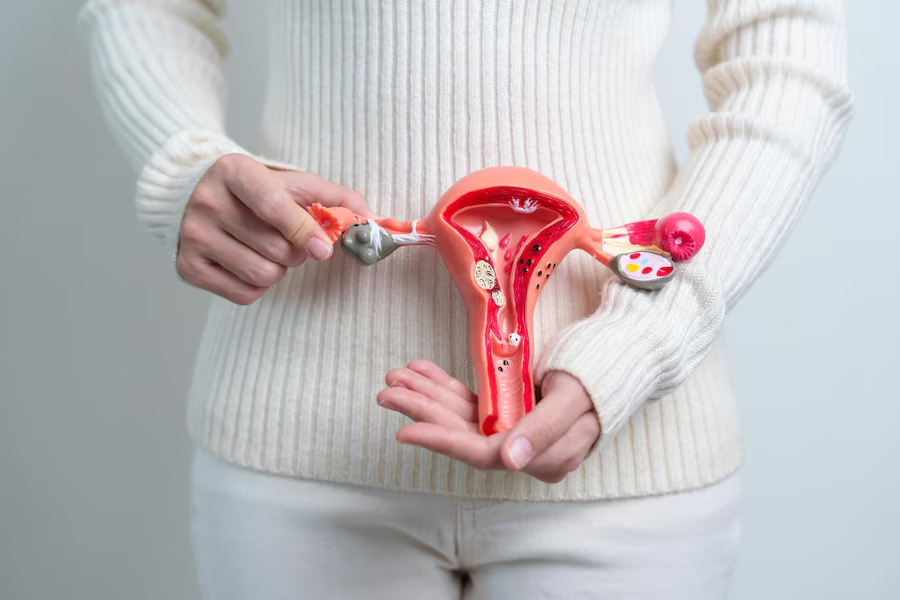
When it comes to getting pregnant, women are often advised to pay attention to things like hormone levels, ovulation monitoring, and eating well. But what if a scheduled pelvic ultrasound pops up something less talked about i.e. a bulky uterus? Is it something to worry about? And, more importantly, will it impact your ability to get pregnant? In an exclusive interaction with the editorial team of Onlymyhealth, our expert, Dr Suma Varsha, IVF Specialist, Ferty9 Fertility Center - Vijayawada, helped us understand this better. Here is what she shared with us.
Table of Content:-
What Is a Bulky Uterus?
“A bulky uterus is not a medical condition per se, it's a term that is used in radiology reports to describe the uterus as being larger than normal. A normal uterus is roughly 7.5 cm long, 5 cm wide, and 2.5 cm thick. When a uterus is described as bulky, it typically means that it is larger than that,” Dr Varsha said. However, the size is not the whole picture and why the uterus is large is what matters most.
Common Reasons for a Bulky Uterus
A number of conditions can cause uterine enlargement. These may include:
1. Uterine Fibroids (Leiomyomas)
These are benign tumours within the uterine muscle. Fibroids can hinder implantation or can obstruct the fallopian tubes depending on their location and size.
2. Adenomyosis
This is when the lining of the uterus (endometrium) penetrates through the muscle wall (myometrium), making the uterus swell. It's accompanied by heavy, cramping periods and may hinder fertility in certain females.

Also Read: Fear Of Checkups? Expert Speaks On How To Deal With Iatrophobia
3. Endometrial Hyperplasia
A growth in the uterine lining usually due to hormonal imbalance. It may thicken the uterus and raise the risk of abnormal bleeding or even cancer of the uterus in exceptional cases.
4. Hormonal Imbalances (e.g., Estrogen Dominance)
Too much estrogen in the absence of sufficient progesterone may cause stimulation of the uterine lining and increase size.
How Can a Bulky Uterus Impact Fertility?
The effect of a bulky uterus on fertility will depend upon its cause and extent of enlargement:
- Implantation Issues: Diseases such as fibroids or adenomyosis may cause distortion of the uterine cavity, making it impossible for an embryo to implant and develop.
- Ovulation Interference: Hormonal uterine causes of swelling may also disrupt normal ovulation.
- Risk of Miscarriage: Research indicates that some uterine abnormalities are linked with an increased risk of first-trimester pregnancy loss.
- Obstruction of the Tubes: If fibroids develop close to the fallopian tubes, they can obstruct the sperm or egg from passing.
That being the case, not all women with a bulky uterus experience fertility issues. Indeed, most go on to have uneventful pregnancies without any medical intervention.

Trying to Conceive with a Bulky Uterus? Here’s What to Do
If you are trying to conceive with a bulky uterus, here are some expert-approved tips for you:
- See a Fertility Specialist: Especially if you’ve been trying for six to 12 months without success.
- Get a Full Assessment: Don't just accept the phrase bulky uterus, demand to know why.
- Be Informed: Empowerment comes with knowledge. Ask questions, request second opinions, and be aware of your treatment choices.
- Stay Optimistic: Many women with bulky uteruses have successful pregnancies without major intervention.
Bottomline
A bulky uterus is not a death sentence for fertility. It's a signal that something might require more careful attention. With advanced diagnostic equipment and customised treatment protocols, women now have more options than ever before to overcome reproductive challenges.
If you've been diagnosed with a bulky uterus, don't worry. Get the facts, ask questions, and collaborate with your health care provider to develop a plan that fits your fertility goals.
[Disclaimer: This article is for informational purposes only and does not replace professional medical advice. If you’re experiencing symptoms or have concerns about fertility, consult a qualified healthcare provider.]
Also watch this video
How we keep this article up to date:
We work with experts and keep a close eye on the latest in health and wellness. Whenever there is a new research or helpful information, we update our articles with accurate and useful advice.
Current Version